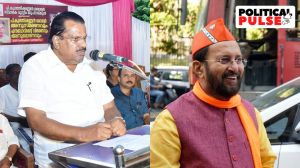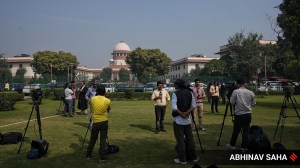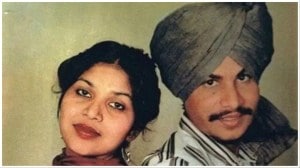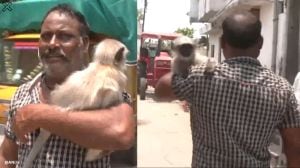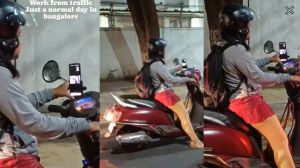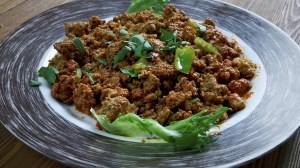- India
- International
A farm labourer in Odisha, helper at gas firm: Meet JNU’s presidential candidate
“My mother died when I was in class VIII. I started sowing others’ paddy fields, for which I would get around Rs 30-40 per day. As part of MGNREGA, I also dug roads and ponds, for which I would get Rs 100-150 per day,” said Suna, who has six siblings.
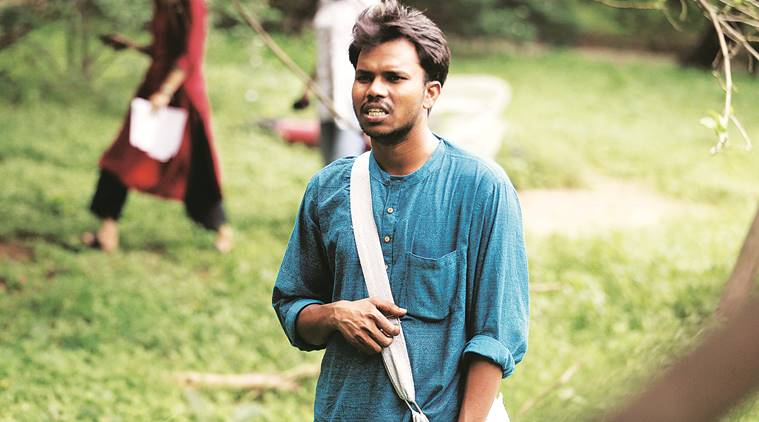 Jitendra Suna is now a PhD student at JNU. (Express photo by Amit Mehra)
Jitendra Suna is now a PhD student at JNU. (Express photo by Amit Mehra)
In 2009, Jitendra Suna (29) worked as a helper with Indraprastha Gas Ltd (IGL) in the capital, fitting gas pipelines, fixing stoves and digging roads in case of pipe bursts. Ten years later, the Dalit PhD student from the Birsa Ambedkar Phule Students’ Association (BAPSA), is contesting for the post of president in the Jawaharlal Nehru University Students’ Union (JNUSU) polls.
Born in Pourkela village in the backward Kalahandi district of Odisha, Suna was introduced to physical labour quite early in life. His mother was a vegetable seller, while his father worked as an agricultural labourer and tilled the one-acre land given to the family during the Land Reforms Act of 1960. The piece of land is now under mortgage.
“My mother died when I was in class VIII. I started sowing others’ paddy fields, for which I would get around Rs 30-40 per day. As part of MGNREGA, I also dug roads and ponds, for which I would get Rs 100-150 per day,” said Suna, who has six siblings.
Suna continued to go to school while working as a labourer. The decision to move to Delhi after completing school was purely an economic one — he had to earn to finish building their house. His brother worked at IGL, so he followed him.
This was also the time when Suna grew more aware of his caste identity. “I had noticed from childhood how we were treated differently, made to eat separately, live in a ghetto. The realisation grew stronger when my brother was questioned about his surname by colleagues, but he did not answer,” said Suna.

The Rs 3,500 per month he got as a helper was not enough to sustain him in the city, leave alone sending money back home. Suna, therefore, decided to go back and complete his graduation.
The major turn in Suna’s life came after his graduation when a friend told him about an institute in Nagpur which was offering free UPSC coaching.
“When I reached Nagpur, I realised it was a 10-month course in Ambedkarism and Buddhism. It was there that I developed an understanding of caste and untouchability… and so I decided to study history and write our (Dalit) history,” said Suna.
At the institute, Suna met students from HCU and JNU and decided to take the JNU MA entrance exam. He enrolled at the university in 2013, and went on to do an MA in History and MPhil from the Centre for Study of Social Exclusion and Inclusive Policy. He is currently enrolled as a PhD student in the same centre and is writing his PhD on ‘History of Identities & Exclusion; Ambedkar and the Marginalised’.
Suna is among the founding members of BAPSA. “We are seeing how the RSS and BJP are destroying democratic institutions… The Left-led JNUSU has failed to stand up to it,” said Suna.
On his agenda is to address the dropout rates in JNU and make sure students get their fellowships. JNU goes to polls on September 6.
Apr 26: Latest News
- 01
- 02
- 03
- 04
- 05

















